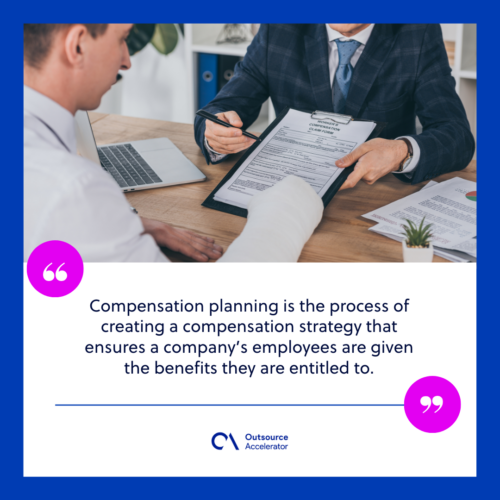Why companies need compensation planning

A sign of a good company to work at is when it pays employees fairly. Companies can achieve this through a solid compensation plan.
Not only does a good compensation plan give your workers the benefits they deserve, but it also increases talent attraction and retention.
Continue reading to learn more about compensation planning and how you can create your own plan.
What is compensation planning?
Compensation planning is the process of creating a compensation strategy that ensures a company’s employees are given the benefits they are entitled to.
Among these benefits include, but are not limited to:
- Salary
- Health insurance
- Government benefits
- Leaves
- Bonuses
- Pension programs
A compensation plan is carefully designed by the human resources (HR) department as it tries to balance the company’s finances while focusing on retaining employees.

Different types of compensation
A compensation plan usually consists of two different types of compensation. Let’s break down their differences:
Direct compensation
Direct compensation refers to the monetary payments given directly to the employees. This type mainly consists of:
- Monthly salary – This is related to the local labor costs or national pay rates.
- Bonuses – These are additional payments on top of the monthly salary awarded to employees with exemplary performance.
- Equity compensation – refers to partial ownership of a company’s shares. It allows employees to share in the company’s profits, which is common among newly established companies.
Indirect compensation
Indirect compensation refers to non-monetary benefits. This type helps make employees’ lives easier and provides convenience by having the company shoulder the expenses.
Some examples of indirect benefits include:
- Medical insurance
- Retirement benefits
- Mental health services
- Paid leaves
- Paid holidays
- Maternity leaves
- Commuter benefits
- Housing
Benefits of compensation planning
Every company needs a well-thought-out compensation plan. Here are some ways having one can benefit your company:
Increases talent attraction and retention
Coming up with the right compensation plan is a good way to attract talent to your organization. Inclusion of these benefits may incentivize potential candidates to apply to your company.
Furthermore, once an employee is eligible for these benefits, they are more likely to remain within the company so that they may continue to take advantage of them.

Maintains compliance
It is mandated by law that companies must offer direct and indirect benefits to their employees. Otherwise, there may be some compliance risks that may affect a company.
Increases employee motivation
Receiving these benefits drives employees to do their tasks well and achieve their goals.
Employees’ benefits are directly related to their performance at work, meaning the better their performance, the higher the chances of eligibility for these benefits.
Key compensation planning tips to remember
Creating a compensation plan requires a lot of research and planning. Here are some tips to help you come up with the best plan:
Create a compensation philosophy
A compensation philosophy allows you to define what you want your compensation package to include. Additionally, it clarifies a lot of compensation-related decisions within the company.
This philosophy serves as the basis of your plan. You should determine what compensation approach to utilize and how it will align with your company values.
Think of it like a Bible for compensation, which outlines various factors, such as:
- Pay-per-performance models
- Payment management
- Compensation frameworks
The goal of a compensation philosophy is to ensure that companies know how they are going to pay and that everyone gets paid fairly.
Do market research
Take the time to research the compensation models of other companies in your industry. This process is called salary benchmarking, which helps you determine your employees’ best compensation rates.
This process can be done internally by the human resources department or externally via a marketing analysis firm that will conduct research for you.
Based on the research done through salary benchmarking, coming up with the right payment model is crucial to satisfying employees as they can expect to be compensated fairly.
Analyze existing compensation models
If you already have an existing compensation structure, ensure it is still competitive and applicable to future employees. You can find this data on your HRIS system.
Consider conducting a pay-equity analysis to ensure your employees are getting compensated for the same amount of work.
Be transparent with your employees
One of the most crucial parts of creating a compensation plan is sharing it with your employees. Of course, since it affects them directly, they must be familiar with how it works.
Communicating each part of the compensation plan shows you care about the employee’s well-being. It makes them feel comfortable and assured that the company has their best interests.
Thoroughly explain the processes of how to avail certain benefits, such as medical or paid leaves, and explain the limitations of each one.

Compensation planning must be fair and transparent
Compensation planning is something that every business must handle with care as it affects your employees and the company directly.
It keeps people happy and confident in the job that they are in and opens the door for new potential candidates to apply.







 Independent
Independent




